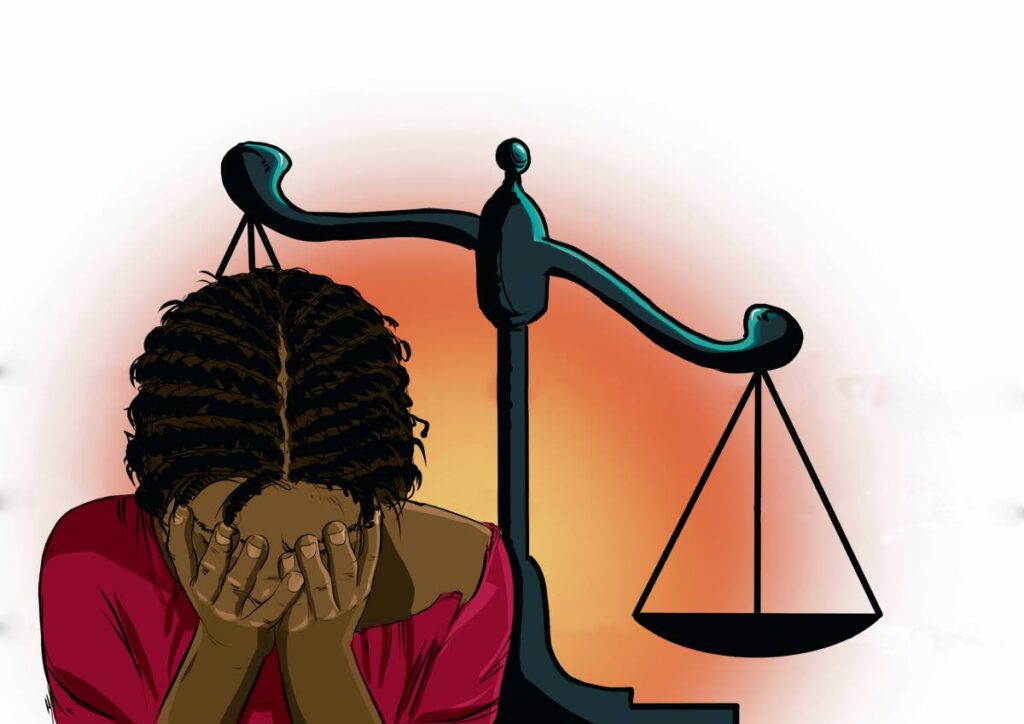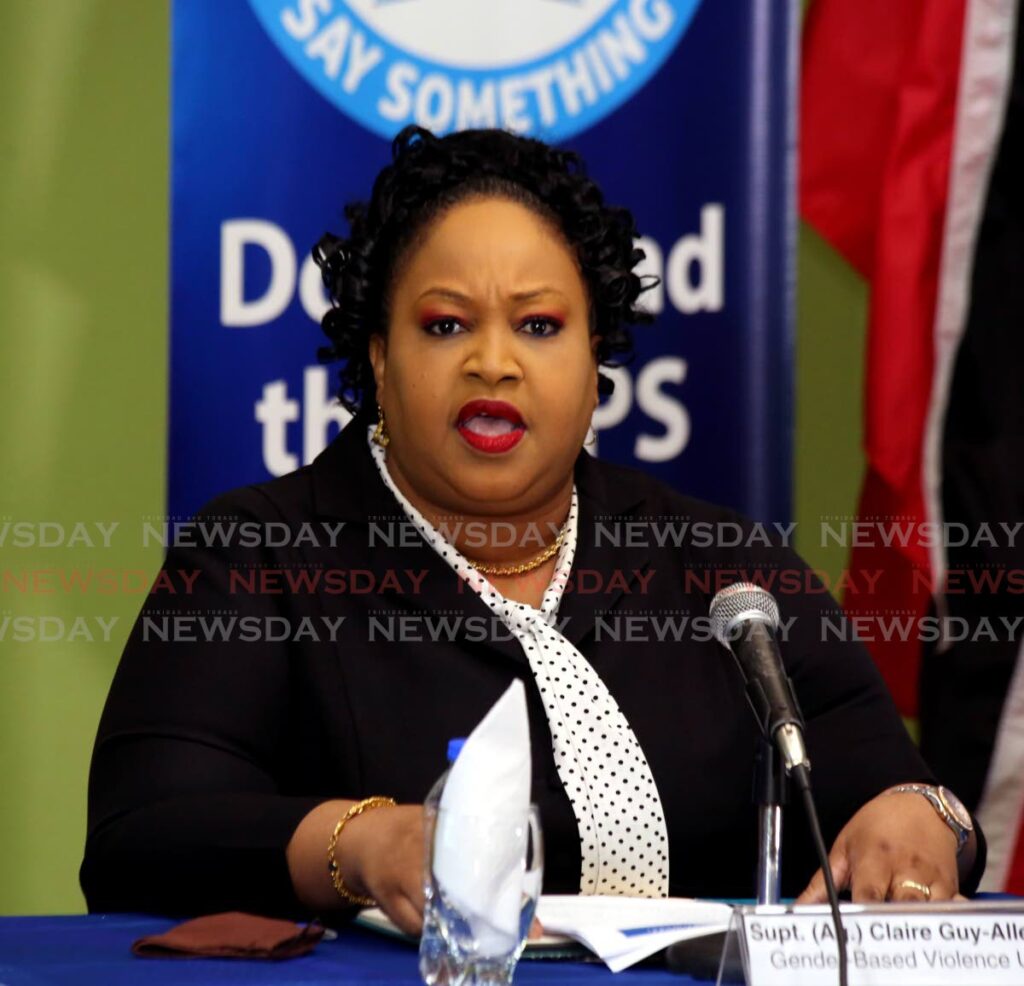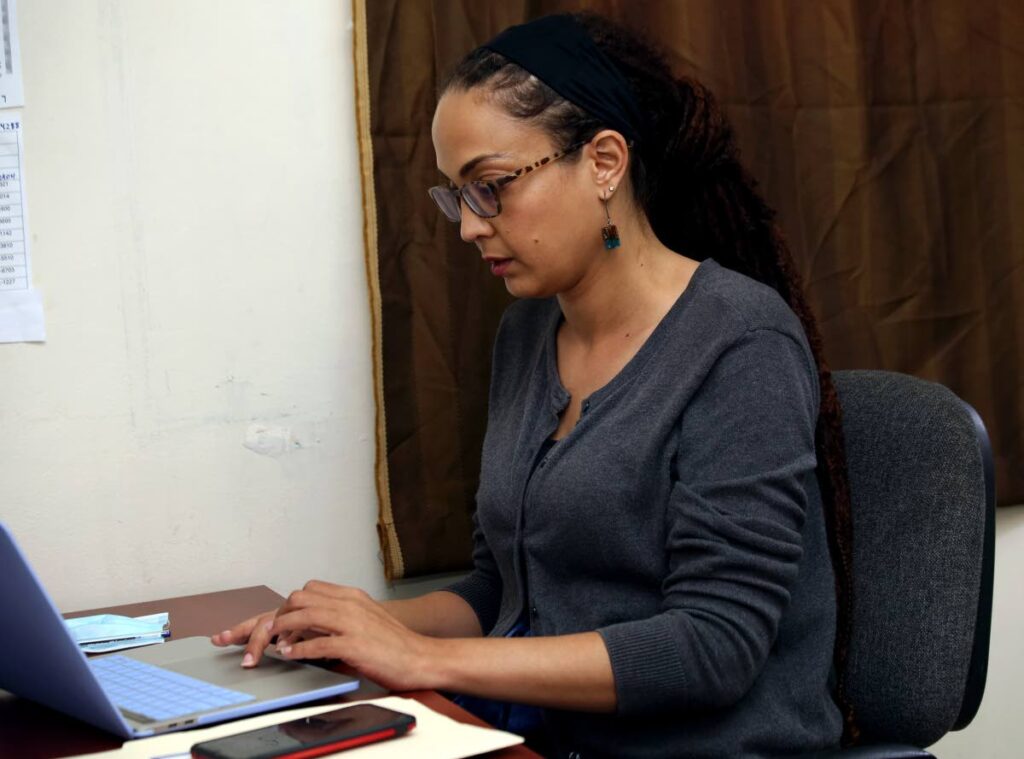5-year wait on courts after attack at age 16: Rape victim's fight for 'justice'

IN 2017, there were 531 reported cases of rape, incest, and sexual assault, according to police figures.
One of those cases was that of a 16-year-old secondary school student. Five years later, she is still waiting on the outcome of the preliminary inquiry into the rape that has robbed her of her sanity.
She now wonders, after all this time, why she even bothered reporting the rape because, for her, it seems the case will never end nor will she get justice.
She has since filed a constitutional motion that calls on the authorities to put mechanisms in place and allocate sufficient resources to ensure criminal matters can be concluded expeditiously.
“The criminal justice system is in crisis and the State has failed to put mechanisms in place and allocate sufficient resources to ensure that criminal matters can be concluded expeditiously,” the claim says.
This, she said, has caused her psychological harm. Her affidavit in the civil matter says she cannot effectively receive treatment for the trauma she is left with because of the attack until the case is concluded. She also says her alleged attacker is out on bail and she fears for her own safety.
“The law does not afford victims of crime the right to be heard on case management decisions.
“The law does not afford judicial officers to consider the rights of victims when making case management decisions. The law does not provide victims of crime with any remedy for the failure of the courts to determine their cases expeditiously.

“Victims of crime are caused psychological harm by the failure of the State to put mechanisms in place and allocate sufficient resources to ensure that their cases can be determined expeditiously.
“The legal system as a whole is unfair to the claimant and to victims of crime generally,” her lawsuit contends.
The woman's complaints about the slow pace of the criminal justice system were echoed by the Prime Minister in March.
Dr Rowley made the observation while responding to a question from a member of the public at a Conversations with the Prime Minister town hall event in Arouca.
He said his Government had given priority, providing hundreds of millions of dollars in resources to the Judiciary in the form of an increased number of masters, judges, courts, and the removal of traffic cases out of the system.
“But speaking as a citizen, I have not seen any acceleration in the delivery of justice. So there must be something, somewhere else,” he said.
Rowley said the best friend of the person who has to answer any charge before the court is “Mr Delay”.
He said his Government had given priority, providing hundreds of millions of dollars in resources to the Judiciary in the form of an increased number of masters, judges, courts, and the removal of traffic cases out of the system.
“But speaking as a citizen, I have not seen any acceleration in the delivery of justice. So there must be something, somewhere else,” he said.
In an interview, the woman said, “I feel broken and stupid.”
She is not alone.
Kimiko Scott, project manager at the Rape Crisis Society, told Sunday Newsday many victims of rape and sexual assault, both male and female, do not report their attacks.
She said one of the main reasons for this was because of the delays involved in the prosecution of cases.
Scott spoke candidly about the effects delays in the criminal justice system had on a victim and their treatment plan.
“Every time having to go to court and face their attacker… If they see the perpetrator… these can be triggering and ‘re traumatises’ the survivor of a sexual assault.”

Delays in the trying of cases, she said, also did not offer survivors finality or “justice.”
“Many of them seek counselling after attending court… It is emotionally distressing to them…There is increased pressure and anxiety… they have to prepare themselves emotionally every time they have to go to court and then after.”
Scott said often times the attacker will use these delays as a tool of power over their victim.
It also causes a halt in their treatment programme and their coping skills can be derailed, Scott said.
“Because of these lengthy delays, 90 per cent of those who seek out the help of the society do not pursue charges against their attacker while many others who do file a report, do not bother to pursue the case fully.”
Scott said the society, along with other non-government organisations which do work with sexual assault survivors, have, in the past, expressed their concerns with the slow pace of the justice system and the effect it has on victims.
“What has been done? All I can say is it probably there sitting in a report somewhere but it has been part of our narrative that the system is deterring people from pursuing charges.”
The Rape Crisis Society treats men, women, and children who have been victims of rape, sexual assault, domestic violence, incest, and child sexual abuse.
Some of their clients walk in from the street and they do get referrals from the Children’s Authority and other NGOs.
At present, the society has a waiting list of 389 people who are seeking counselling from their six on-staff counsellors who work on a part-time basis. In 2021, the society saw 700 people.
“We see people who have come to us years after the attack but would have been triggered by something that is affecting their present life.
“Some even just call for us for information … They don’t know if they were raped…”
She said for a victim of sexual assault, the trauma lives on.
Now 21, the woman said she sometimes feels as if she didn’t fight enough.
Her civil lawsuit is not only for herself but also for others.
“It happening to others.” She said when she goes for counselling at the society, there are little girls and boys there.
Her fight is to ensure victims of crime are acknowledged.
She recounted her ordeal in 2017 when someone from the area where she lives raped her.
She stopped going to school and her grades were also affected.
Her horror was compounded when she found out she was pregnant. She said she knew it was her alleged attacker’s child because she never had sex with anyone else.
Months later, her alleged attacker was arrested, charged, and released on bail. She attended court and had to face the man.
She tried to overdose on pills three times during her pregnancy to “get rid of the baby.” She said she eventually kept the baby, telling herself the child was hers only.
“I still am fearful of him because I know how serious the charge is and this country is very dangerous.”
She has since been diagnosed with post-traumatic stress disorder and chronic depression and continues to have suicidal thoughts.
She has also tried leaving her child with relatives with thoughts of wanting to “get rid” of the infant.
Meanwhile, the case dragged on in court for four years. She said she was advised to attend court on each occasion to show she was interested in the case or it will get “thrown out.” She has done so earnestly.
At a court hearing in 2021, she was asked by the prosecutor if she was still interested in the case.
“I told him of course I am, that is why I am here.”
She said the matter has been adjourned, on some occasions, “for a stupid reason.”
She said she was told the case could take 10-15 years to be completed. “…dealing with the court is unbearable…I want to move on with my life.”
Her lawsuit says since the covid19 pandemic, “everything has only gotten worse” as each time the case is called, someone is recorded as being sick or she would receive the link to the virtual hearing too late so that she cannot appear on time.
“I feel like I’m trapped and there’s no way out. I just want this case to be over so I can get on with my life.”
She admitted it was frustrating.
“I don’t know why the matter taking so long,” she said.
In an interview, the woman’s attorney Lee Merry said “there were hundreds, if not thousands of victims, including women and children, who cannot get over their trauma because of the failure of our leaders to treat with the criminal justice system.”
“Just look at the pandemic response, press conferences almost every day, a coming together of experts and resources, keeping the public informed step by step.
“What is being done about victims of crime having to wait 10 years for justice? There are many countries where specific rights and protections are afforded to victims, such as South Africa and also many states in the US.
“No specific protections are afforded to victims in TT and it appears that their interests have been completely forgotten in the mess that is our criminal justice system.
“Nobody seeks their view when their matters are adjourned over and over again. If their interests were being considered, these excessive delays would not be possible.”
In TT, on average, it takes 10-15 years for a matter to get to trial, but there is no official data on this.
Merry’s non-profit High Tide Project has coincidentally sued both the Judiciary and the Office of the Director of Public Prosecutions for information regarding the progress of all capital cases.
He is yet to get the information.

Internationally, court
delays are not uncommon
“Court delays leave Scots victims of crime facing ‘wait for justice,” read one headline to a report on figures provided by the Scottish government in its monthly criminal justice monitoring data. Blame was placed on the failure of the authorities to tackle delays in Scotland’s justice system which could lead to victims ‘losing faith' in the system.
In TT, to get information about criminal matters, a freedom of information request has to be filed.
In this case, a similar request was made by Merry and his co-counsel Larry Boyer, for information on criminal rape charges determined in the High Court over the past five years; the number of indictments pending at the High Court, and the number disposed of in the same period.
In New Zealand, a report in the NZ Herald spoke of the stress on victims.
“Criminal charges are being dismissed, stress on victims is compounding…,” while, again, in the UK it was said delays in sex offence cases averaged 13-and-a-half-months from start to finish.
In a recent human rights report, the US State Department identified lengthy pre-trial detention as a problem with detainees spending up to a decade before their case started.
The report also spoke about the access rape survivors had to national crisis hotlines, temporary shelters, and psycho-social services through law enforcement referrals.It also said the police’s victim and witness support unit encouraged the reporting of rape and domestic violence.
In February, last year, acting superintendent of the police’s gender-based violence unit, Claire Guy-Alleyne encouraged the public to have confidence in the police and urged victims to come forward to file reports.
In a television interview on CNC3’s Morning Brew, Guy-Alleyne said, “Rape is a very heinous crime. It takes a lot from a victim – a survivor – of such a crime to make a report. We would have instances where survivors would come and would make a report of rape, and that person is not ready as yet to even provide police with a statement.
“We have systems within the TTPS where that survivor can be offered psycho-social support before we even commence recording statements from them,” she assured.
“Rape is a crime, and the perpetrator must be held accountable,” she asserts. “That is the only way we will eradicate rape from this country.”
She reminded there is no statutory limitation on rape and encouraged sexual assault victims and survivors to file reports of their assault, regardless of when the crime was committed.
“The Police Service provides an avenue for survivors to come forward and feel comfortable to make their reports so that the investigations can proceed, and their cases can be taken before the courts of Trinidad and Tobago, and that perpetrator can be successfully prosecuted,” she said.
The PI case at a glance
FOR four years, the case in the summary court languished before the preliminary began in March 2022. During that time, four magistrates and a magistracy registrar presided over it. It is being prosecuted by the police. Court records show the matter first came up in October 2017, when the accused was granted bail after the charge of sexually penetrating a child, age 17, was read.
Between October 2017 and December 2021, the matter was called 24 times. The records show only twice the police complainant was absent – the first time for medical reasons and the second time he was flooded out. Some of the reasons given for the adjournments included the disclosure of evidence and the swearing, filing, and serving of statements. On varying days, the prosecution was not ready and had to be warned by the presiding magistrate.
When the current presiding magistrate took over in February 2021, case management was completed by December and the matter progressed to trial in March. Parties had agreed to paper committal and on March 22, all parties completed their evidence. The matter was adjourned to April 21, at which time the defence attorney was expected to make certain submissions. On that date, counsel did not, and the magistrate is expected to give a decision on May 3.
PIs yet to be abolished
Former attorney general Faris Al-Rawi had assured the legislation to abolish preliminary inquiries would be proclaimed by January 2, 2022. It has not.
When it is, they will be replaced by sufficiency hearings at the High Court and will be heard by Masters of the High Court who will determine if a matter should go to trial.
At the opening of the 2021/2022 law term, Chief Justice Ivor Archie noted the backlog of sexual offence cases and the particular effect delays, standard processes and procedures had on victims. He announced an intention to bring a sexual offences court into operation.

Comments
"5-year wait on courts after attack at age 16: Rape victim’s fight for ‘justice’"